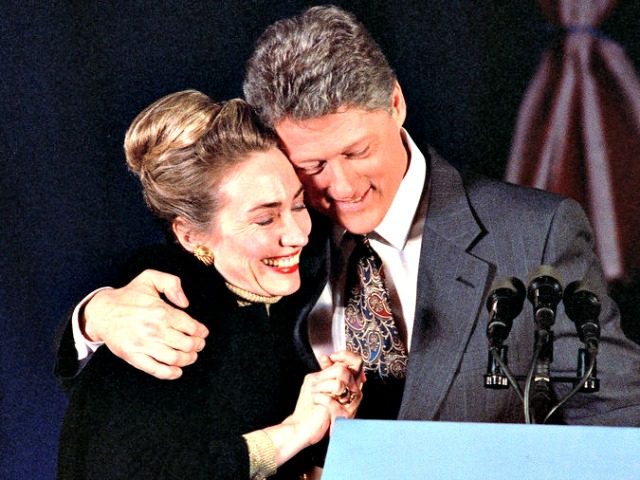In his Tuesday economic address, Donald Trump challenged the media to ask Hillary Clinton if she will pledge to withdraw from the Trans-Pacific Partnership (TPP) on her first day in office and rule out its passage in any form.
Clinton has a long history of supporting and promoting the Trans-Pacific Partnership, yet she now claims not to support the deal in its current form. Trump warned the American electorate that if elected President, Hillary Clinton would “immediately approve” the TPP.
Trump explained that Clinton played a “leading part in drafting the Trans-Pacific Partnership. She praised or pushed the TPP on 45 separate occasions, and even called it the ‘gold standard.’ Hillary Clinton was totally for the TPP just a short while ago, but when she saw my stance, which is totally against, she was shamed into saying she would be against it too – but have no doubt, she will immediately approve it if it is put before her, guaranteed.”
“She will do this just as she has betrayed American workers for Wall Street throughout her career,” Trump said.
Here’s how it would go: she would make a small token change, declare the pact fixed, and ram it through. That’s why Hillary is now only saying she has problems with the TPP ‘in its current form,’ – ensuring that she can rush to embrace it again at her earliest opportunity.
Trump then issued a challenge to the media: “If the media doesn’t believe me, I have a challenge for you. Ask Hillary Clinton if she is willing to withdraw from the TPP her first day in office and unconditionally rule out its passage in any form.”
“There is no way to ‘fix’ the TPP,” Trump said. “We need bilateral trade deals. We do not need to enter into another massive international agreement that ties us up and binds us down.”
Trump explained that the TPP will devastate American workers and manufacturing:
The TPP would be the death blow for American manufacturing. It would give up all of our economic leverage to an international commission that would put the interests of foreign countries above our own. It would further open our markets to aggressive currency cheaters. It would make it easier for our trading competitors to ship cheap subsidized goods into U.S. markets – while allowing foreign countries to continue putting barriers in front of our exports. The TPP would lower tariffs on foreign cars, while leaving in place the foreign practices that keep American cars from being sold overseas. The TPP even created a backdoor for China to supply car parts for automobiles made in Mexico. The agreement would also force American workers to compete directly against workers from Vietnam, one of the lowest wage countries on Earth.
Trump went on to highlight the deal’s implications for national sovereignty:
Not only will the TPP undermine our economy, but it will undermine our independence. The TPP creates a new international commission that makes decisions the American people can’t veto. These commissions are great Hillary Clinton’s Wall Street funders who can spend vast amounts of money to influence the outcomes.
As Breitbart News has previously reported, the dissolution of U.S. sovereignty that would result from the creation of the TPP’s global governing commission does not seem to concern Clinton.
Clinton’s prior aggressive boosting of the TPP demonstrates her underlying support for the international structures that underpin globalism. While Clinton can look at the text of the TPP and claim that she wants to see certain tweaks made to the deal, someone who fundamentally opposes the idea of binding the nation to a global governing commission would not be able to support the TPP in any form. Clinton does not fundamentally oppose the TPP nor object to its implications for U.S. sovereignty.
Indeed, the Clintons are ardent supporters of the globalist trade policies that have sent jobs overseas. As former counselor to the secretary of Commerce, Clyde Prestowitz, has explained, much of the trade globalism that has come to define our current trade policy that has impacted American workers and sovereignty began in the 1990s under the Clintons’ rule.
“In the 1990s, international trade morphed into the far broader and more complex phenomenon of globalization,” Prestowitz wrote:
In 1992, the United States, Mexico and Canada essentially extended the 1988 U.S.-Canadian Free Trade Agreement into the North American Free Trade Agreement or NAFTA. … The agreement was essentially for an economic union, looser than but similar to the EU arrangement. Then in 1993, President Clinton hosted the first meeting of the leaders of twenty-one nations of the Asia Pacific Economic Cooperation (APEC), who committed to greater economic integration of their nations. Finally in 1994, the Uruguay Round of GATT negotiations concluded by turning the GATT into the World Trade Organization (WTO).
Bill Clinton also negotiated China’s entrance in the WTO, which Hillary Clinton supported. Prestowitz described China’s entrance into the WTO as one of “America’s dumbest deals … [that] reduced American influence and power, and constrained its future wealth-creating ability.”
As Donald Trump noted in his Tuesday address: “America has lost nearly one-third of its manufacturing jobs since 1997 — even as the country has increased its population by 50 million people. At the center of this catastrophe are two trade deals pushed by Bill and Hillary Clinton. First, the North American Free Trade Agreement, or NAFTA. Second, China’s entry into the World Trade Organization.”

COMMENTS
Please let us know if you're having issues with commenting.